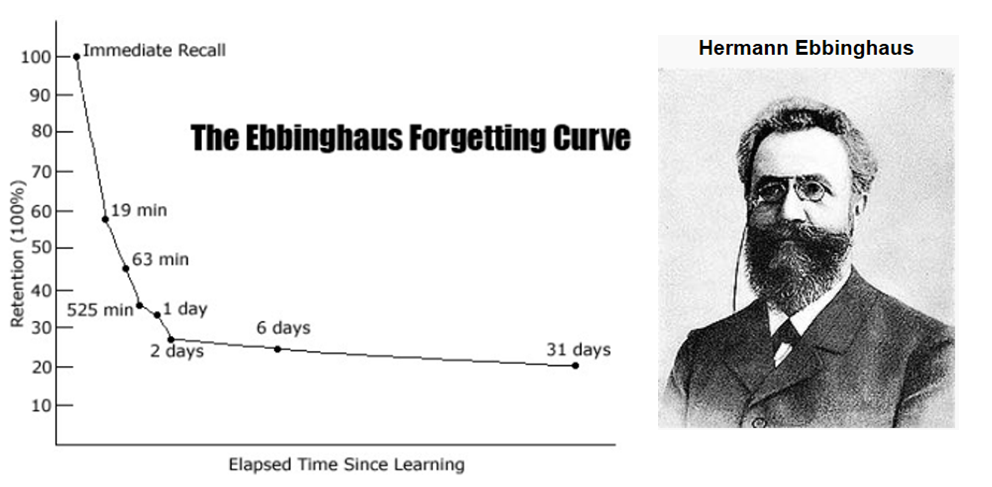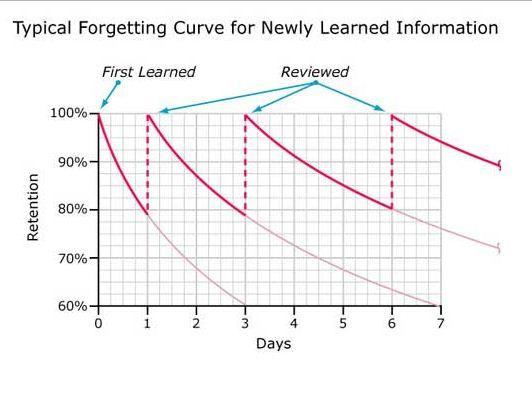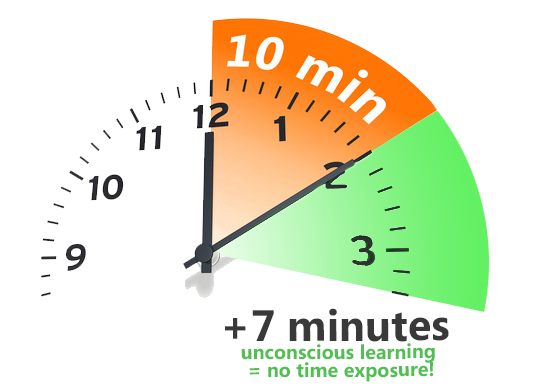Repeating learning material is essential for retaining what you learned. Big surprise? Not really. Now, did you know that you should repeat every new topic at least three times for effective learning progress.
Why repeat everything at least 3 times?
Within 20 minutes we forget 40% of what we learned. After another 40 minutes, we forget half of it. One day later, we will have lost more than 70%.
What’s left is the things that touch us or interest us most – the top 30%. Unfortunately, we need to know more than a third of a foreign language to be able to speak and understand it fluently, just as one must retain a certain amount to play a musical instrument or to pass an exam on school.
The percentages mentioned above were tested and proven by the German philosopher Hermann Ebbinghaus (1859 – 1909). In an experiment, subjects examined a list of 15 fictitious syllables, such as NAK, DIB or DAF. At different points of time afterwards, he tested how much they could still remember und reproduce.

The result: people forget the most within hours. Within the days that follow, the retention curve flattens.
Ebbinghaus also tried to influence the power of memory. He discovered different influential factors, such as prior knowledge, talent, interest, context of learning and emotional factors. The neural synaptic speed, which is responsible for how fast your brain works, also influences your personal forgetting curve.
The above factors contribute only a little to the curve’s deviation. The only way to keep as much as possible is an idea established by the Latins: “Repititio est mater studiorum” (repetition is the mother of studies).
How often should you repeat newly learned information?
After you have learned new information – i.e. for language studies, playing a musical instrument or anything else – let it sink in for a few hours. You will lose most of this information, but it is just part of the process. After one day, repeat it for the first time to get back to 100% again. The 30% that you remember will not need much attention in the upcoming days. Still, take a closer look at those 70% of information you’ve lost. The more often you repeat it, the better you will remember it; repeated information will eventually be stored in your long-term memory.
In summary: Repeat everything at least three times to store it in your long-term memory.

How long should your learning sessions be?
Another result of Ebbinhaus’ studies is the spacing effect. It says that learning is much more successful if it happens over time. This means that three 10-minute sessions a day is better than one hour-long session a day. This beneficial strategy was also examined by Vera F. Birkenbihl, a German management trainer and author who came up with a brain-friendly way to learn a new language (see brain-friendly.com for more information).
Therefore, shorter tests and exams during the semester proved reasonable, since student are encouraged to learn little pieces of information step by step, instead of learning a large amount to cram for a single exam. Little stages of progression help you to store the information in your long-term-memory.
Why should we study this way? The human brain subconsciously learns and processes information that we have just heard or learned for up to 7 minutes after each study session. This happens without you even noticing. As we start thinking about other things or studying another subject, our brain is still processing information from the previous session.
This means that you can almost double your learning success by dividing your learning sessions into 10-minute exercises.

10 + 7 = 17
10 minutes of active learning + 7 minutes of subconscious processing = a totaled 17 minutes spent learning.
In summary
Concentrate on each subject or exercise for 10 minutes. Then, switch to another topic. Short learning periods are better, since they are brain-friendly, double your total learning time and keep your brain fresh and focused.
